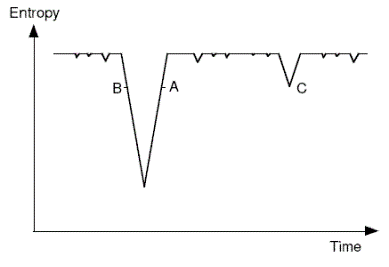|

| Boltzmann's Brain objection TegenArgument1 #104158 Given that the probability of low entropy states diminishes exponentially, we would expect to find ourselves in the minimum entropy fluctuation consistent with conscious experience. This would not be the appearance of a whole universe - just a minimal 'Boltzmann brain'. | The case of a Bolzmann brain is depicted by point C in the diagram. Points A and B are the much less probable states in which a conscious brain exists in a whole universe - like the one we (like to think) we live in.  |
+Citaten (1) - CitatenVoeg citaat toeList by: CiterankMapLink[1] Boltzmann Brain objection
Citerend uit: Sean M. Carroll - Senior Research Associate, Department of Physics, Caltech
Geciteerd door: Peter Baldwin 7:52 AM 15 April 2011 GMT
Citerank: (3) 104151Boltzmann's statistical imperativeBoltzmann provided a statistical argument to show that an isolated system not at maximal entropy will is overwhelmingly likely to evolve toward higher entropy - hence the second law and the thermodynamic arrow.109FDEF6, 104155Boltzmann-Schuetz hypothesisBoltzmann and Schuetz claimed that in a universe that is near thermal equilibrium, and given sufficient time, there will be regions where there is a temporary deviation into a low entropy state, from which it will trend back to equilibrium. Anthropic selection accounts for us being in such a region.959C6EF, 114699Conscious observer requirement Conscious observers can only exist in an environment capable of evolving complex life, which requires the dissipation of free energy. This cannot occur in a condition at or near thermodynamic equilibrium. Hence observers like us will only be found in regions of the multiverse far from equilibrium.109FDEF6
URL:
| | Fragment- "The most basic problem has been colorfully labeled 'Boltzmann’s Brain' by Albrecht and Sorbo. Remember that the low-entropy fluctuations we are talking about are incredibly rare, and the lower the entropy goes, the rarer they are. If it almost never happens that the air molecules in a room all randomly zip to one half, it is just as unlikely (although still inevitable, given enough time) that, given that they did end up in half, they will continue on to collect in one quarter of the room. On the diagram above, points like C are overwhelmingly more common than points like A or B. So if we are explaining our low-entropy universe by appealing to the anthropic criterion that it must be possible for intelligent life to exist, quite a strong prediction follows: we should find ourselves in the minimum possible entropy fluctuation consistent with life’s existence.
And that minimum fluctuation would be “Boltzmann’s Brain.” Out of the background thermal equilibrium, a fluctuation randomly appears that collects some degrees of freedom into the form of a conscious brain, with just enough sensory apparatus to look around and say “Hey! I exist!”, before dissolving back into the equilibrated ooze.
You might object that such a fluctuation is very rare, and indeed it is. But so would be a fluctuation into our whole universe — in fact, quite a bit more rare. The momentary decrease in entropy required to produce such a brain is fantastically less than that required to make our whole universe. Within the infinite ensemble envisioned by Boltzmann, the overwhelming majority of brains will find themselves disembodied and alone, not happily ensconsed in a warm and welcoming universe filled with other souls. (You know, like ours.)"
|
|
|